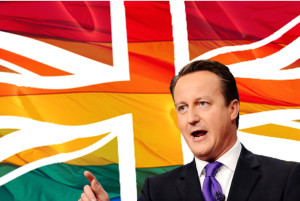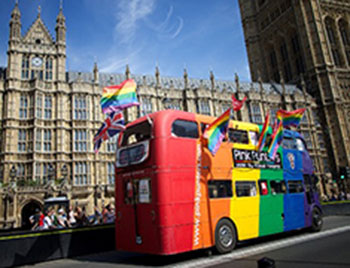A new study in the Journal of Epidemiology followed 6.5 million Danish persons for nearly 30 years (for a total of 112.5 million person-years) looking at how living arrangements (being single, cohabiting, married, widowed or in a same-sex union) affected their health outcomes.
 From the official abstract:
From the official abstract:
"[Hazard Ratios] for overall mortality changed markedly over time, most notably for persons in same-sex marriage. In 2000–2011, opposite-sex married persons (reference, HR = 1) had consistently lower mortality than persons in other marital status categories in women (HRs 1.37–1.89) and men (HRs 1.37–1.66). Mortality was particularly high for same-sex married women (HR = 1.89), notably from suicide (HR = 6.40) and cancer (HR = 1.62), whereas rates for same-sex married men (HR = 1.38) were equal to or lower than those for unmarried, divorced and widowed men. Prior marriages (whether opposite-sex or same-sex) were associated with increased mortality in both women and men (HR = 1.16–1.45 per additional prior marriage)."
The conclusion of the authors:
"Our study provides a detailed account of living arrangements and their associations with mortality over three decades, thus yielding accurate and statistically powerful analyses of public health relevance to countries with marriage and cohabitation patterns comparable to Denmark’s. Of note, mortality among same-sex married men has declined markedly since the mid-1990s and is now at or below that of unmarried, divorced and widowed men, whereas same-sex married women emerge as the group of women with highest and, in recent years, even further increasing mortality."
Commentary from the English Manif blog:
"During 2000 to 2011, Danish male-female married couples were the healthiest and least likely to die at various ages compared with individuals who were unmarried, divorced or widowed. In contrast, same-sex married men in Denmark were no healthier than unmarried men. Same-sex married women had much higher mortality rates than other women, including the ones who were unmarried, divorced or widowed. There was no apparent marriage “benefit” in terms of better health or longer life for these same-sex married women.
While this is just one study that needs to be supplemented by more research, it does suggest that the health benefits of marriage may be unique to the male-female union. Governments may try to legislate a revised version of “marriage,” but they cannot legislate the health and longevity benefits that come from a man marrying a woman."
 The same can be said in America. Despite the droning drumbeat of the mainstream media, nearly two-thirds – 65 percent – of Americans disapprove of redefining marriage.
The same can be said in America. Despite the droning drumbeat of the mainstream media, nearly two-thirds – 65 percent – of Americans disapprove of redefining marriage.


 The bill had the full support of Prime Minister David Cameron, despite strong opposition by his Conservative Party. Cameron’s support appears to have come at a high political price with the article noting that, “some political commentators predict Cameron’s gay-friendly attitudes will cost him at the next election in 2015.”
The bill had the full support of Prime Minister David Cameron, despite strong opposition by his Conservative Party. Cameron’s support appears to have come at a high political price with the article noting that, “some political commentators predict Cameron’s gay-friendly attitudes will cost him at the next election in 2015.” From the official
From the official  Unionists voted down a motion at Stormont's Assembly which called on the power-sharing ministerial Executive to legislate.
Unionists voted down a motion at Stormont's Assembly which called on the power-sharing ministerial Executive to legislate. The Finnish parliament’s Legal Affairs Committee on Wednesday voted narrowly to reject a bill to legalise equal marriage.
The Finnish parliament’s Legal Affairs Committee on Wednesday voted narrowly to reject a bill to legalise equal marriage.






 The legalization of same-sex marriages and adoption was one of the most contentious points in Socialist President Francois Hollande's election manifesto earlier this year.
The legalization of same-sex marriages and adoption was one of the most contentious points in Socialist President Francois Hollande's election manifesto earlier this year.



